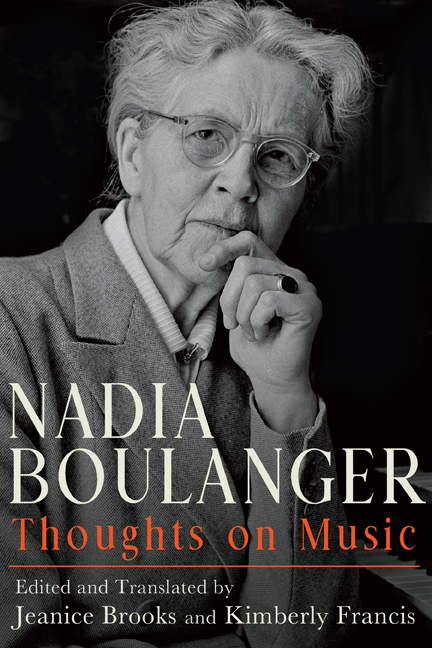Book contents
- Frontmatter
- Contents
- List of Illustrations
- Acknowledgments
- Editorial Apparatus and Critical Notes
- Note on Translations
- List of Abbreviations
- Timeline of Nadia Boulanger’s Life
- Introduction
- Part One Journalism, Criticism, Tributes
- Part Two Lectures, Classes, Broadcasts
- Bibliography of Nadia Boulanger’s Published Writing
- General Bibliography
- Index
Lecture on Gabriel Fauré (undated [between 1940–49])
Published online by Cambridge University Press: 15 October 2020
- Frontmatter
- Contents
- List of Illustrations
- Acknowledgments
- Editorial Apparatus and Critical Notes
- Note on Translations
- List of Abbreviations
- Timeline of Nadia Boulanger’s Life
- Introduction
- Part One Journalism, Criticism, Tributes
- Part Two Lectures, Classes, Broadcasts
- Bibliography of Nadia Boulanger’s Published Writing
- General Bibliography
- Index
Summary
Ladies and gentlemen,
Please excuse the solemnity of this talk, devoted to the themes of serenity and grandeur.
We know ourselves to be witness to a crisis that seems to us like no other—to us, everything seems, everything is perhaps, in doubt. We believe that never before have the most contradictory principles battled one another with such violence. Unintentionally, tirelessly, we seek the causes of these crises that oppose, and have always opposed, skepticism and faith, opportunism and conscience, facility and rigor, violence and truth, and today, quantity and quality.
We are troubled—and we are quick to conclude that we are in full decline.
Restricting myself to the only domain I have any right to examine, I could commiserate with you over the commercialization of light music (yet there are delightful examples), over the extreme abstraction of a music that seeks new foundations (yet we already owe it some masterpieces), over the exacerbated romanticism of works betraying terrible anxiety, almost intolerable tension, and surprising mastery.
However, we also see affirmed the permanence of values that I would willingly describe as moral and spiritual in nature, with indestructible values, and I have chosen as the center of this talk an artist who never put them in doubt. I was a child when I had the extraordinary privilege of meeting Gabriel Fauré—at the threshold of his death, I keep the enchanted memory of that presence; I better understand his importance, I see better the reasons for the influence it exerted. I see more clearly what it represents as essential and always contemporary.
No life was simpler than the life of Gabriel Fauré.
A few themes were developed from childhood to death, with exceptional harmony. The sentiment of duty, the cult of friendship, the sense of measure, exquisite modesty, and a singular aristocracy of thought.
It matters little that Gabriel Fauré was an organist first at Rennes, then in Paris, at Notre Dame de Clignancourt, at Saint-Sulpice, then at La Madeleine. Or that he became professor of composition at the Conservatoire, member of the Institute, Grand Officier of the Légion d’honneur, that so much official glory should have surrounded in old age the one who was so gently, but so irreducibly, independent.
[Instead,] one likes to remember his no doubt unique modesty, his ineffable charm, his most discreet generosity.
- Type
- Chapter
- Information
- Nadia BoulangerThoughts on Music, pp. 399 - 406Publisher: Boydell & BrewerPrint publication year: 2020

